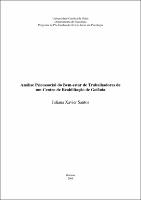| Compartilhamento |


|
Use este identificador para citar ou linkar para este item:
http://tede2.pucgoias.edu.br:8080/handle/tede/2025| Tipo do documento: | Dissertação |
| Título: | Análise Psicossocial do Bem-estar de Trabalhadores de um Centro de Reabilitação de Goiânia |
| Autor: | Santos, Juliana Xavier  |
| Primeiro orientador: | Torres, Ana Raquel Rosas |
| Primeiro membro da banca: | Zanini, Daniela Sacramento |
| Segundo membro da banca: | Nazareno, Elias |
| Resumo: | O objetivo principal deste estudo foi analisar o bem-estar dos trabalhadores da saúde vinculados ao Centro de Reabilitação e Readaptação Dr. Henrique Santillo (Crer), relacionando-o com a adesão à crença no mundo justo e com o lócus de controle. Crença no mundo justo refere-se ao fato das pessoas acreditarem que o que se recebe ocorre por mérito, assim como, quando são castigadas, também o são por merecimento. Já lócus de controle é a maneira pela qual o indivíduo percebe a relação entre seus esforços e o resultado desses esforços, sendo que aquele que tem a clareza dessa relação é internamente orientado, e aquele que não a tem, é externamente orientado. A partir dos estudos revisados, pressupôs-se que os participantes que apresentassem alta crença no mundo justo teriam, consequentemente, alto nível de bem-estar e o inverso também aconteceria, baixa crença no mundo justo, baixo nível de bem-estar. Quanto a relação entre lócus de controle e bem-estar, os participantes com lócus de controle interno apresentariam alto nível de bem-estar e aqueles com lócus de controle externo, baixo nível de bem-estar. Participaram do estudo 146 profissionais, com formação variando entre nível médio e superior. O questionário era composto de dados sócio-demográficos, escalas de bem-estar físico e psicológico, lócus de controle e crença no mundo justo. Os resultados mostram que os participantes apresentam alto nível de bem-estar, alta crença no mundo justo, alto lócus de controle externo, baixa crença no mundo justo e baixo lócus de controle interno. Os resultados da regressão múltipla mostram uma relação positiva entre lócus de controle externo e bem-estar, e uma relação negativa entre lócus de controle interno e bem-estar. Não houve resultados significativos na relação entre crença no mundo justo e bem-estar. Estes resultados são discutidos ressaltando que as diferenças com a literatura devem-se muito mais à maneira como os instrumentos foram construídos do que a inconsistências teóricas. |
| Abstract: | The aim of this study was to assess the well-being of health workers linked to the Centro de Reabilitação e Readaptação Dr. Henrique Santillo (Crer), relating it with the accession to a belief in a just world and the locus of control. Belief in a just world is related to the fact that people believe that what is received is by merit, and when they are punished, it is also by merit. Locus of control is the way the individual perceives the relationship between their efforts and the outcome of these efforts, and who has this notion of relationship is internally oriented, and those who do not, is externally oriented. From the studies reviewed, it is assumed that participants who show high belief in a just world would, therefore, have high levels of well-being and the inverse also happens, low belief in a just world, low level of well-being. As to the relationship between locus of control and well-being, participants with internal locus of control would present high level of well-being and those with external locus of control would have low level of well-being. Took part in the study 146 professionals, ranging from high school to university level. The questionnaire consisted of socio-demographic data, scales of physical well-being and psychological locus of control and belief in a just world. The results showed that participants have a high level of well-being, high belief in a just world, high external locus of control, low belief in a just world and low internal locus of control. The results of multiple regressions showed a positive relationship between external locus of control and well-being, and a negative relationship between internal locus of control and well-being. There were no significant results in the relationship between belief in a just world and well-being. These results are discussed emphasizing the differences within the literatures about it are due, more to, how the instruments were built than the theoretical inconsistency. |
| Palavras-chave: | bem-estar crença no mundo justo lócus de controle Well-being belief in a just world locus of control |
| Área(s) do CNPq: | CNPQ::CIENCIAS HUMANAS::PSICOLOGIA |
| Idioma: | por |
| País: | BR |
| Instituição: | Pontifícia Universidade Católica de Goiás |
| Sigla da instituição: | PUC Goiás |
| Departamento: | Ciências Humanas |
| Programa: | Psicologia |
| Citação: | SANTOS, Juliana Xavier. Análise Psicossocial do Bem-estar de Trabalhadores de um Centro de Reabilitação de Goiânia. 2009. 76 f. Dissertação (Mestrado em Ciências Humanas) - Pontifícia Universidade Católica de Goiás, GOIANIA, 2009. |
| Tipo de acesso: | Acesso Aberto |
| URI: | http://localhost:8080/tede/handle/tede/2025 |
| Data de defesa: | 5-Nov-2009 |
| Aparece nas coleções: | Mestrado em Psicologia |
Arquivos associados a este item:
| Arquivo | Descrição | Tamanho | Formato | |
|---|---|---|---|---|
| Juliana Xavier Santos.pdf | 280,63 kB | Adobe PDF |  Baixar/Abrir Pré-Visualizar |
Os itens no repositório estão protegidos por copyright, com todos os direitos reservados, salvo quando é indicado o contrário.




